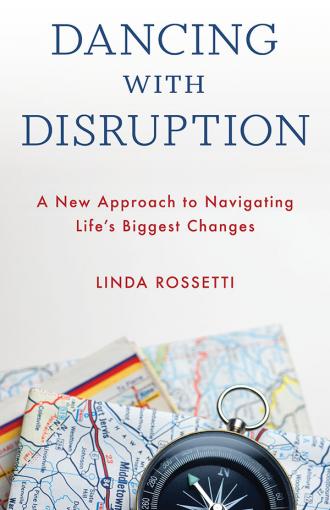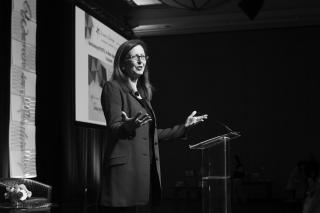Linda Rossetti ’86 is an entrepreneur, author, and researcher who specializes in transformational change. We spoke with her about navigating life’s changes and the supportive relationships she formed at Simmons.
“I am drawn to the topic of transition throughout our careers and our lives,” says entrepreneur, researcher, and writer Linda Rossetti ’86. “This can be navigating a job loss or a promotion, welcoming a new child, or the loss of physical capabilities. These things can change when we are 28 or 88 … My interest lies in how we respond to those changes.”
An economics degree and Simmons’ approach to leadership and social impact inspired Rossetti for three decades, leading to her role as a CEO and founder of a venture capital backed technology start-up, as an executive vice president at global publicly-traded Iron Mountain, as a researcher and writer of inspirational books on changes in our careers and lives, and as the leader of an intervention program tackling the college mental health crisis.
Professional Transitions
An economics major at Simmons, Rossetti spent the early part of her career in finance; specifically, the loan officer development program at a global bank in Boston. This work focused on financial transformations, i.e., how one company can buy another one.
After obtaining an MBA from Harvard University’s Business School, Rossetti founded and led a large technology company that partnered with conventional businesses to integrate new technologies at the dawn of the internet revolution. She also worked in an organization transformation capacity in a leadership position at Iron Mountain, a large global company.
During an all-day CEO’s staff meeting, Rossetti recalls a pivotal moment in her attitude toward change. “I had a seat at the table, which I always thought was the thing I wanted,” she recounts, but even in her leadership she felt that there was “more,” although she couldn’t articulate what that meant at the time. After consulting with individuals in her network and reframing certain questions, Rossetti was ready to embrace change and to research it by leading focus groups and hearing others’ stories.
“I learned from others that when we encounter an upheaval of any kind [personally or professionally], we have much more power to respond to it than we are socialized to believe,” she says. “These moments of upheaval are invitations to change … and this means that the concept of self is not fixed. It is dynamic.”
Individuals, she believes, have myriad opportunities to re-examine and recenter their sense of self. Rossetti, who is currently pursuing a doctorate in human development from Lesley University, perceives transformational change as a larger trajectory of developmental growth.
Welcoming Disruption
Rossetti’s first book, Women and Transition: Reinventing Work and Life (Palgrave Macmillan, 2015), explores the gendered aspects of transition. “My hypothesis at the time was that, because of women’s many care roles, they are forced to redefine themselves again and again in ways that men are not asked to do,” she explains.

In her second book, Dancing with Disruption: A New Approach to Navigating Life’s Biggest Challenges (Rowman & Littlefield, 2023), Rossetti interweaves her own story with those of her many interlocutors. Based on research she conducted through an online discussion group, in-person focus groups, and hundreds of one-on-one interviews, the book demonstrates how people can navigate the various disruptions that transpire over the adult lifespan.
Dancing with Disruption “is for people who are experiencing all sorts of disruptive events in their lives. That could be a loss of a partner, a breakup, the arrival of a child, fertility issues, geographic moves, or career-related stuff. It honors how difficult those things are while also providing a roadmap to help navigate them successfully,” Rossetti says.
In particular, Rossetti offers advice and exercises to help readers reframe their emotional responses to change.
“These initiating events are not really the story,” Rossetti explains. “The opportunity lies in honoring how these events influence that which holds value and meaning to us. As we recenter on this shift, we experience an emergence of our self with a stronger voice, renewed agency, and a more expansive awareness of our capabilities.”
It is this enlivening process that Rossetti has witnessed time and again in her research. She added, “One interview participant who had lost his sight said of this process, ‘I see so much more now.’”
Ultimately, “transition is an empowering expansive process that is universally available to all adults in the face of upheaval,” Rossetti concludes.
Majoring in Economics at Simmons
Rossetti’s path to Simmons began with a chance encounter with professors of economics. “I was truly inspired by how thoughtful and smart they were,” she recalls.
“For me, the discipline of economics was a beautiful fusion,” Rossetti says. “I like math and numbers, and am also very socially minded. Economics is a way to think and be analytical but also study social impact, which fascinates me.”
While at Simmons, Rossetti had memorable exchanges with Professors (now Emeritae/i) Harriet Tolpin, Donald Basch, Barbara Sawtelle, Daphne Kenyon, and others. “These folks are incredibly dedicated leaders in their profession,” she notes.
“At Simmons, we are encouraged to develop our full selves: our cognitive, creative, and social selves, and this is so important … Simmons gave me the courage to keep testing and using my voice,” Rossetti remarks. “I also learned that it always takes a collaboration to get something done … Finding your voice and being invested in your community is really what my work is all about.”
Simmons’ economics faculty continue to inspire Rossetti. Currently, she is co-writing an article on the impact of COVID-19 on career transitions with Professor Niloufer Sohrabji. “I cannot say enough about the economics group at Simmons. I consider them mentors, colleagues, and friends,” she says.
Through Simmons’ ECONnect network, Rossetti stays involved with multiple generations of Simmons alumnae/i and economics faculty. “ECONnect is a platform for connection for students and alums … You can call or email anyone on this list and ask for support, help, and guidance,” she says.
For Rossetti, networking is not merely transactional. “It’s really about how you foster relationships. Your network can help you during moments of upheaval, but it can also be mobilized long before any disruptive event. And Simmons has a great alumnae/i network.”
Advice for Future Professionals
As words of wisdom to Simmons students, Rossetti hones in on change and coalition-building. “Go toward change, not away from change,” she says. “Change opens up opportunities that we can’t even envision at the outset.”
It is also important to recognize that “others are part of the story here,” Rossetti says, advising future professionals to foster community. “Make yourself available to listen to others and reach out to others as partners in thought … These coalitions will help you step forward into meaningful change along the trajectory of our careers and our lives.”

